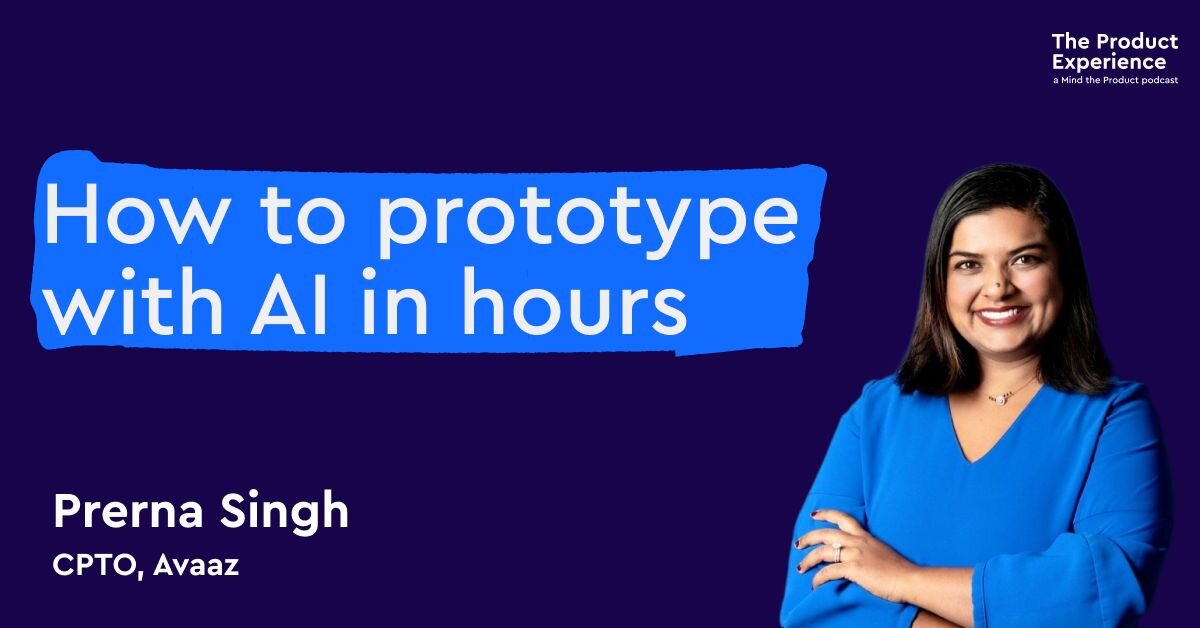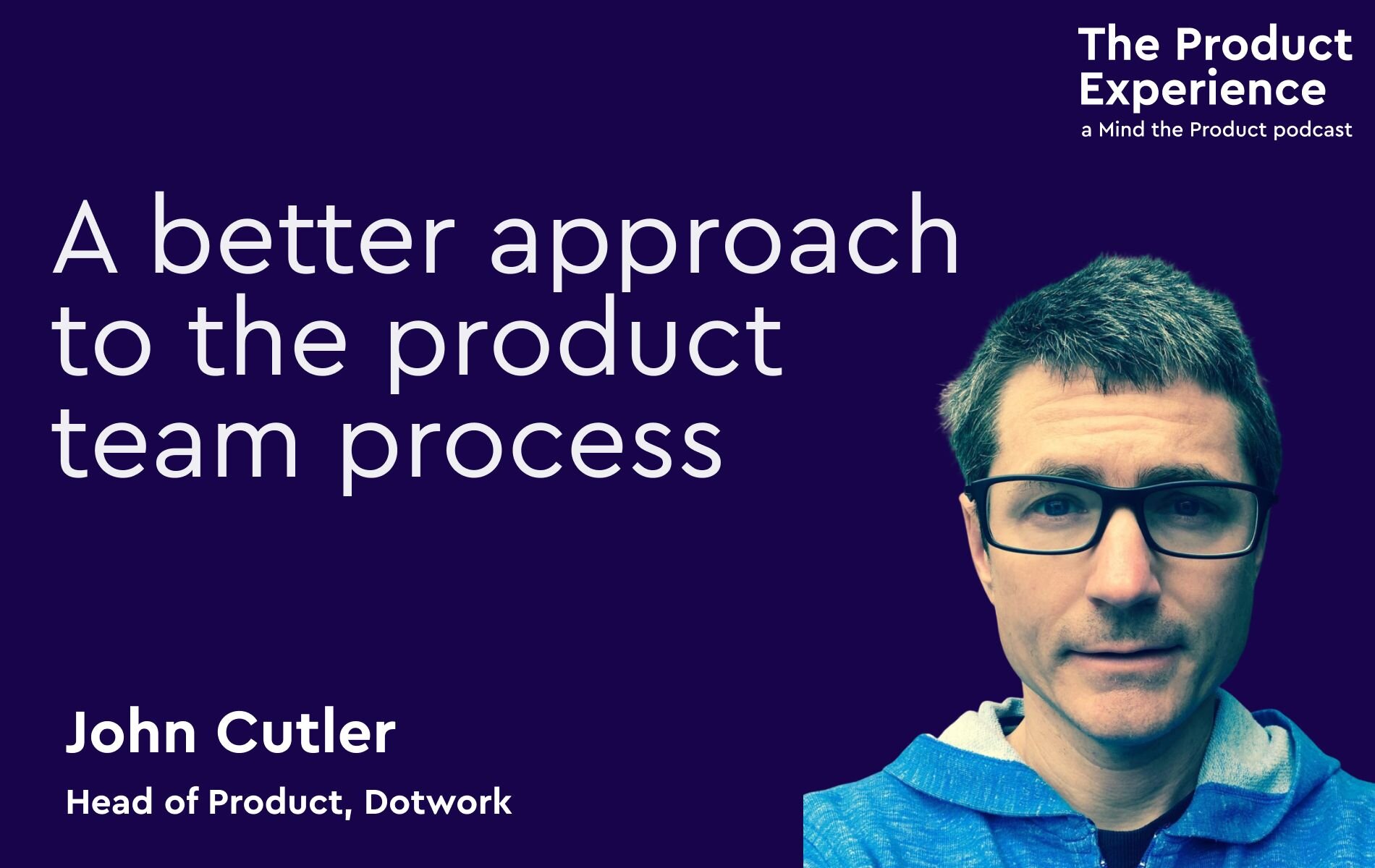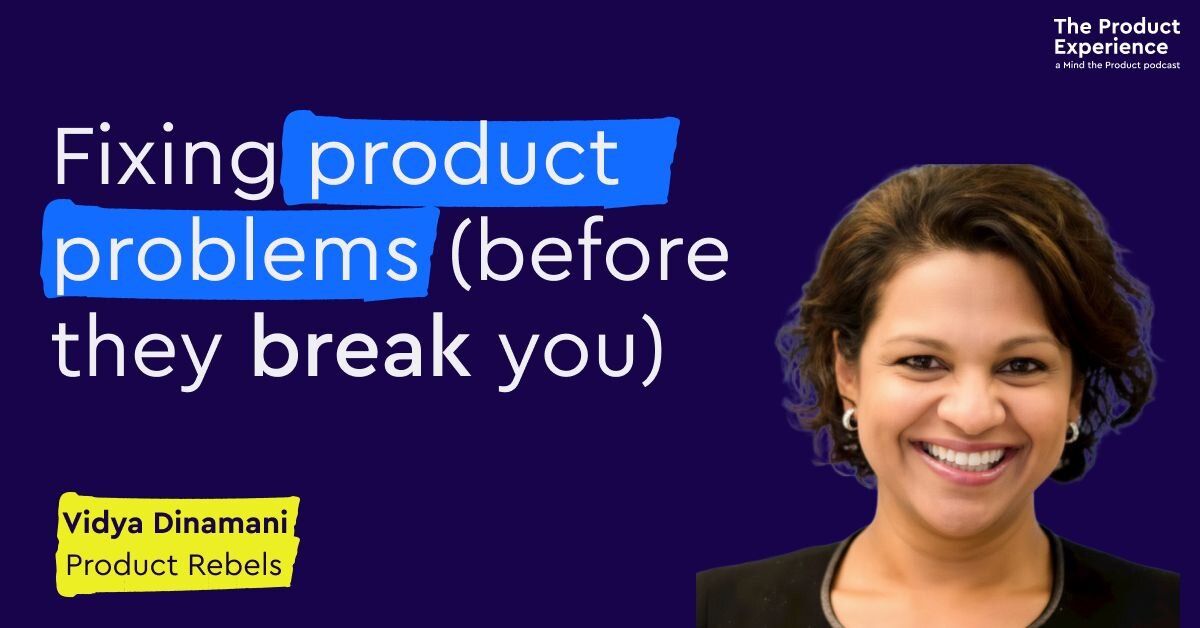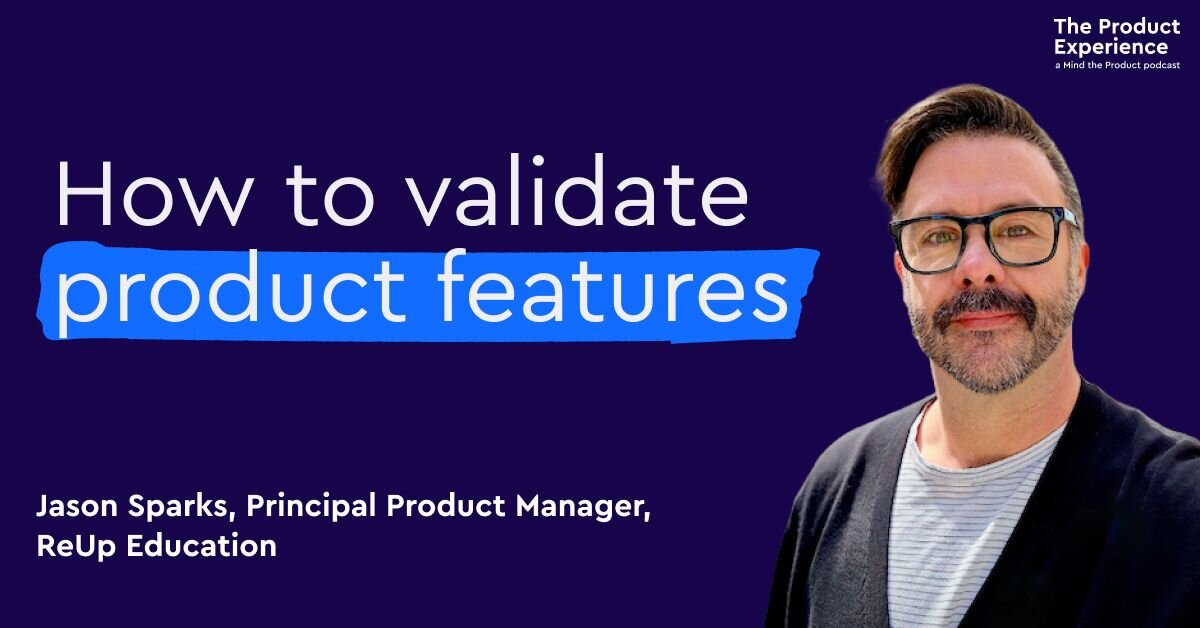What makes a great manager and what are the most important factors in making the leap to leading a team? In this weeks' podcast episode, Lily and Randy were joined by the amazing Melike Hope, Product Director at Twitter, to talk all about managing people and scaling your career.
Featured links
Featured Links: Follow Melika on LinkedIn and Twitter | Melika's IC to Manager video | 'How to be a great manager' – Claire Lew on The Product Experience| Listen to this episode on Youtube!
Episode transcript
Randy Silver:
Hey, Lily, is this a good time to talk? I think I think I might like to make a change,
Lily Smith:
Randy. Of course it is. I always have time for you.
Randy Silver:
It's just Well, you see, we've been working on this podcast for a few years now. And I think I'm ready for some more responsibility and, and the title that comes with it.
Lily Smith:
Really? I'm not sure. Actually, just just kidding. Just kidding, of course. So you want to move from co host to head of hosting or host director?
Randy Silver:
I mean, I haven't really thought the title part through yet
Lily Smith:
what the title is the most important part, isn't it? But also I had my eye on that head of hosts role.
Randy Silver:
Okay, let's let's do this, then, let's decide right here. And now, as of this moment, we're both now officially chief hosting Officer of this podcast.
Lily Smith:
Okay, that sounds great. And it's probably a good thing. We're talking to Malika hope Director of Product Management at Twitter all about moving into a management role, and how to make the decision and some of the hardest parts of the job.
Randy Silver:
It's something both of us have actually done in our day jobs moving from individual contributor into management. But Malik has put a lot of thought into the process. So let's get right to our chat with her.
Lily Smith:
The product experience is brought to you by mine the product. Every week on the podcast, we talk to the best product people from around the globe, visit mine product.com to catch up on past episodes and discover more
Randy Silver:
rails for free, or become a mind that product member to unlock premium content, discounts to our conferences around the world, and training opportunities. Mind the product also offers free product tank meetups in more than 200 cities. near you. Malika, thank you so much for joining us on the podcast today.
Melika Hope:
It's my pleasure. Thank you for having me.
Randy Silver:
So for anyone who doesn't already know you, can you just give us a really brief intro. So how did you get into product? And what are you up to these days?
Melika Hope:
Awesome. So how did I get into product? Um, I went to business school and became a public accountant. And after a few years of that, I thought, Oh, wow, this is not what I want to be doing. So I applied to a bunch of jobs. And one of them was to be a product manager for the software company that made the software I used as an accountant. And they were the first company that hired me. And so I took that job. And that's how I became a product manager. And that was, Oh, I'm not even gonna say how long ago
Randy Silver:
is at least three weeks? Yeah, cuz there's
Melika Hope:
a couple of roles in there a lot in like if a accounting software space, and I have now been at Twitter for the last year and a half.
Randy Silver:
Fantastic. And the topic we're talking about today is about making the leap from an individual contributor to a manager. So when did you first make that change?
Melika Hope:
Um, so a big chunk of my career I spent at into it about seven years. And I think I was maybe two and a half years into my job as a senior product manager there. When I got promoted to a group product manager. I started with one or two direct reports out the gate. And within a couple years, I had like five teams reporting to me,
Randy Silver:
and what was it like? What did you What did you notice?
Melika Hope:
So I had to start managing someone who was a peer of mine, which was like the first challenge. He had much less experienced as a product manager than me. But we worked as peers, and we had been reporting to the same person. So that was like a very different type of experience. As far as management, I also immediately had to start hiring my own backfill. And so getting thrown into hiring, without any real training, I think a lot of new managers experience. But I think the thing that really sticks out to me is I was really concerned with being like a cool boss, and being likeable. And I put way too much focus on that then was I an effective boss, and it wasn't and that kind of caught up to me later.
Lily Smith:
Was it a decision for you to actually move up into that managerial role? Or was it just like a no brainer, like, this is the way that my career is headed, and this is what I know I want to do next.
Melika Hope:
It was a no brainer for me. I will say it took some convincing of the people that actually made the decision to bring me into that role. I'm young, for you know, what I'm doing right now and my age has not always been a benefit, I would say in my career. And so definitely when I wanted to make the leap into management, it wasn't just manager role. It was like head of product for Canada. Like it was one in the same and so you know, that brought up questions about my capability. use as a people manager, but also as a senior leader in the organisation. And if I was ready for that, but personally, I had wanted to manage people like my whole career, I was really excited to do it.
Lily Smith:
So in terms of making that decision, you have a framework, I love a good framework that you use EAS, tell us about your four DS framework.
Melika Hope:
So the four DS and I cannot take full credit, a colleague of mine at Twitter named Amber gave me like a starting point for this. And so the first D is decide, decide if you want to be a people manager. The second D is Ooh, declare, like let people know that you want to be people management manager and get your voice out there. The third is demonstrate, demonstrate that you can be a people manager and that you have the skills to get promoted. And then once you get there, the fourth D is deliver. If you actually make that leap, you've got to be able to show pretty quickly that you know what you're doing.
Randy Silver:
Okay, so decide to clear demonstrate deliver, it sounds obvious. But let's go through them a little bit, because I'm sure there's quite a bit in there. Quite a bit of nuance in there. So let's start with decide what is making the decision about whether people management is the right thing for you
Melika Hope:
decide is actually, I think, the most important D in the framework. And that's because a lot of people feel like they have to be people managers in their career. Like, you know, Lilly, you asked the question earlier about if it was a no brainer for me, I put a lot of thought into it. And I had this strong desire to manage people, but do a lot of people. It's just what the only way to show progression in their career or the only promotional path for them. And I will say that if you want to be like a VP or a CEO, you absolutely will have to manage people like there is a ceiling. But a lot of companies now have workstreams, where you can be an individual contributor for you know, and get quite senior. And I think you really have to think about why like the reasons why you would go for a people management role, it can be a drag, like there's a lot of crap you have to deal with as a people manager, there's a lot of performance reviews, there's a lot of HR stuff, there's you know, delivering hard feedback, there's a lot, it's a lot of time, and a tonne of effort that you are not spending doing, you know, strategic work that may be more stimulating for certain people. But it also can be incredibly rewarding, but it's really taking the time to think through, why am I doing this? What do I can I bring to people management? And do I feel like I actually have the capability set to do this well, and the desire to always try to get better at it. And, and so thinking through those questions is really important before you actually try to make the leap.
Randy Silver:
What's something that makes it an anti pattern New Year where someone should say, You know what, this isn't actually for me? What's the the warning signs?
Melika Hope:
You mean? Once you are a people manager or beforehand?
Randy Silver:
Let's go with both because I have a feeling there's lots of people who make the leap and then say, Ooh, this isn't quite what I expected.
Melika Hope:
Yeah, I think if you've made the leap, it really comes down to anytime there's like people management activities that you have to perform, do you dread them? And as I said, some of them are a drag across the board. But do you avoid one on one conversations with your staff? Do you avoid, you know, trying to level yourself up like I have a coach that strictly works with me on people management and like we we work on me being a better people manager all the time, because I feel like it's not a skill set you that you just learn like you. You're always learning just like you're always learning anything in business. And so do you have if you don't have the desire to do things like that, and growth and development isn't something you're passionate about, you'll figure that out really quickly, because you'll dread doing those tasks. I think ahead of time, it's kind of similar. So before I was a people manager, I spent a tonne of time mentoring, I spent a tonne of time doing peer coaching. I had a lot of folks that would come to me interested in getting into product management, which I think a lot of PMS experience, especially at larger companies. And I would take a special interest in them and helping them understand the role and what could be there. So I think I was doing everything I could ahead of time to to get my feet wet, I guess in that field. And that's what I would recommend as well. And if you have no appetite for that type of work again, you may want to ask yourself why? And maybe it's because you haven't thought about it. And really you could get into it. But generally I find if there's something you really want to do with your career, you're gonna take the steps to do it even before it's kind of official.
Randy Silver:
How do you know if it's going well at that point and whether you know, you're cut out for it?
Melika Hope:
That's a good question, because it probably won't go well at first because it's really easy to make this like no new role goes well, like right out the gate. I would talk to your reports. I think it's really underutilised for managers to ask their direct reports for feedback. And I think that like I really try to and I want to To achieve this, because I probably have reports listening to this, but I try to have like a really transparent feedback culture where I am constantly giving constructive and celebratory feedback. And I really encourage them to do the same for me, and to be super, super transparent and honest. And I think that those, there will be pieces that come up when you start to feel rewarded, or you start to see the impact that you're having. And that can be really good positive reinforcement down the road.
Lily Smith:
So the second day was declare, does this mean like, big announcement on Slack? Right, guys? I'm ready. Whatever, your manager?
Randy Silver:
Uh, well, I was thinking Gone With the Wind, you know, I do declare.
Melika Hope:
I mean, people are going and doing all sorts of crazy stuff on LinkedIn, with their careers. So I would not be surprised if someone did post, like a tweet saying, I'm ready for this, like, give me some tips. But I again, I know a lot of this I draw from my own experience, I was really timid about, you know, making it known that this is something I wanted to do. And I think a lot of women fall into this trap, like for years, and again, I said, I was quite young. I knew I wanted to be a people manager, I wanted that rule that I ended up getting that head of product rule. And even, you know, three years in advance where I knew I was too Junior, what what I would tell someone to do now is to go to your leaders and say, Hey, I know I'm not ready for that role today. But I want to let you know that in three years, I want to be ready for it. So can we work on a plan today? To help me get there? And can you help me identify the skills I need to develop and I was way too shy to say that I was like, if I expressed interest in this people, it's gonna be embarrassing, they're just gonna be like, Oh, my gosh, Malika, you're nowhere near ready. And I think that that held me back. And a lot of what you see when people are that are really successful in business is that they're able to put themselves out there and be a bit audacious with the goals that they have and where they're trying to get to. And I encourage people to try to channel some of that Audacity.
Randy Silver:
Who do you tell is it just something you say to your manager, or
Melika Hope:
you can say to your manager, if you have any mentors, you can say to your peers, you can say to other leaders, any professional networks that you're involved with. And this isn't unique to people in management, any type of goal that you have, like, you want to change industries, you want to change careers, you want to move to a different company, no one's gonna like come to you and hand you favours, letting people know what you're interested in will only benefit you.
Lily Smith:
Okay, so how do you demonstrate managerial skills when you aren't actually being a manager? How do you kind of show that you're ready to take that move?
Melika Hope:
This one is tough, because a lot of it, you really can't show unless you are an actual manager. I think there's a lot of icy roles like even like senior product manager roles where people have one direct report maybe. So at that level, I think you can start asking, a lot of companies have internship or like APM type programmes, you can get involved with mentoring and coaching through that a lot. Most companies have formal mentorship programmes you can get involved with. As I said before, I did a tonne of coaching, and mentoring for more junior PMS, both within my company and another other networks that I was involved with. But there's also a lot of other skills that you need to be a manager like that you can demonstrate you can demonstrate empathy, you could demonstrate coaching to people that are your peers are more senior than you, you can demonstrate the ability to multitask, like there's a lot of other pieces than strictly coaching and performance management that come into being effective leaders. And I think that really thinking critically about what those skills are or thinking about other managers that you admire, and the type of activities or traits that they portray, and examining if you're able to portray those in a certain way in your role, or Goodstart. A
Randy Silver:
lot of times what I've seen is it's not the people management skills that people are promoted for. It's because they delivered a project or because they had good stakeholder management, or they presented a strategy Well, or something like that. So what is it that we should be demonstrating to get to that next level?
Melika Hope:
Okay. And that's where it depends on the role, right? Like what I told you before my role, it wasn't just people manager, it was head of product, and I would say that was like 75 90% of what they were looking for. And it was 10%. Can she manage people will assume She'll figure that out. And so I can't really give the guidance there. Because it really I think it really depends on the role. And I think examining that rule, and what you feel people are truly looking for. And the best way to figure that out is going to the source and talking to the hiring manager or talking to the people that are making the decisions and saying, I have an interest here. What are the capabilities that you're looking for? What are the qualities like I can't stress enough how much I've learned in my career. But just like this is part of the declare, just ask and tell people what you're interested in, and they'll usually give you the information. So I would I would say that it really, it's probably going to be unique depending on what you're looking for.
Lily Smith:
Okay, that makes sense. And on the delivery side of things, then so you've got the role. And now you have to kind of prove that you're, that they made the right decision.
Melika Hope:
Yeah, and I mean, this one, I mean, don't put too much pressure on yourself, because as I said, to mess up at first, don't fall in the same trap I did, of trying to be a cool boss. Although it's really tempting, it's really tempting when you're especially when you're new or young manager to want to be liked by your staff, actually, you know, I see very seasoned senior people that still fall into this trap, and they really want to be liked. But I would say that, like, take it really seriously. And this is where I think some of that intention comes in, like, Do you truly want to manage people? Or is it just kind of part of a job that you're looking for? I would take it really seriously, if you if you haven't had a lot of good people, managers. Hopefully, you've had at least one. And this is what my coach worked with me a lot on, and I and we went through what made him a good manager, let's define all of the traits, let's define all of the like activities that he did to run the team effectively, let's try to model those things. And if you've had a lot of poor people, managers, and you don't think you've had one that you know, you can model behaviour off of start looking at or talking to other people start trying to find mentors in that space. Like I can't stress enough how helpful it was to have someone to talk through some of those initial challenges that I faced in that role. And get some external feedback from people that were more experienced because it's this. It's part of the job that people want to talk about as much people talk about strategic problems all the time, but people management problems are not as focused on but if you really want to nail it, that's the best way to start in my opinion.
Lily Smith:
Is anyone else totally ready for mine the products London conference happening in October. If you've been before, you're probably feeling a bit like me desperate for your MTP conflicts. And if you're new to it, this is the product conference not to miss. If you're a product person looking to advance your career, expand your network, get inspired and bring the best products to market, then this is for you. So what can you expect? Well, MTP con is known for that epic lineup of speakers, renowned product leaders with invaluable insights and tactics to share. They cover a range of exciting topics that will challenge and inspire you to step up as a product manager, always with something tangible to take away into your own product practice. And this year is a pretty special one too, as it marks a decade of MTP Khan. So I'm expecting cyan coloured cupcakes for sure. You can go fully digital for the two days or with a hybrid ticket, you can go digital on day one and in person at the Barbican in London for day two, very cool, find out more and book your ticket at mind the product.com forward slash London.
Randy Silver:
So the bit one of the best days I've ever had as a manager is the day when I get to tell someone that they've gotten a promotion. So tell us a little bit about what it's like how you've gotten other people promoted, or people you've promoted yourself.
Melika Hope:
So the first person I got I promoted was the same person I mentioned earlier who was a peer of mine. And then I became his boss. And then we immediately started working on his promotion. And I mean, that's kind of a cop out because he was like a super strong performer. He's now a director of product. And I can't take credit for that. But that's another way that if you're looking to demonstrate your value as a manager, and you shouldn't be doing this, because it's not about you, it's about the person, but it does demonstrate that you're an effective manager if your people get promoted. And so he was a super strong performer. He told me, he declared, he told me very clearly, this was his expectation of me as his manager was to help him get promoted. And I was thrilled, like, managers want to hear this stuff. They want to help you get where you want to go. But they can't do that if you don't tell them. So he declared, we worked on exactly what he would need to demonstrate in order to get that promotion to go through. And then we pulled it off pretty easily like he had a strong performance record. I think that and then after I left my last job, I believe he was given a similar role to the one that I had had. So he went on to have a really great career, but I think that following the pro process that I just described, like the process I just described doesn't have to be unique to people in management, it can be a general promotion template, like decide. I mean, usually, it's pretty straightforward that you want to get promoted in some capacity. But the declare and the demonstrate components are things that ideally, you're working on together with your manager. And that's, that makes that manager job easy. And it makes them more excited about going through the promotion process with you if they feel like it's a shared process together.
Lily Smith:
And it sounds like everything that you said, makes loads of sense. And it sounds really straightforward. But I imagine it can, these conversations can be quite tough in an environment that's maybe a little bit tougher, like, perhaps a little bit toxic, or, you know, just not very supportive. And I'm thinking back to like, a very early conversation in my career where I spoke to one of my managers and, you know, told him what I wanted, which was to be a director of a company one day, and he was like, oh, no, it's like, you have to go to board meetings, and you want to be at home with your children. Just like if, you know, if people are listening to this, and they're thinking, I'm not gonna get the, the response that I want out of my manager by having these conversations, like, what's the best other way that they can, you know, that they can still try and work their way up?
Melika Hope:
That's a really great question. And I've been in like, I've been in similar positions that have still been okay. So getting into that head of product job, I, it was, like, clearly expressed to me that, you know, they were looking at external candidates, and they weren't entirely sold on me. But they gave me enough of an opening that I fought for that role, and I put everything I had into it, I was able to be successful. I've also had managers telling me full on. Yeah, I don't think we're gonna consider you for that with no context, and no, nothing to help me figure out what I should be doing. So I think there's a couple of paths that you can take, the first I would say, is pushing your manager a little bit. And so if they said that to you, I would say you know, what, actually, I've done a lot of research about that director position, and what that would look like. And that's exactly aligned with what I think I want to do with my career. So if you aren't seeing that in me, I'd love for us to sit down and have a comprehensive conversation about why you feel like that's not the right path for me, and what behaviour changes I need to make to get there. And that this is when you just need to really know if it's a poor people manager or a good one, because a good one should smarten up and be like, oh, man, this person is serious. Like, I need to get my act together. But plenty of managers will refuse, which, I mean, anyways, is
Lily Smith:
a great. I wish I'd had you giving me advice.
Melika Hope:
And some you just don't feel comfortable enough with to push because if the environment is super toxic, so I would say that in those cases, you need to really assess like, is this gonna happen for me at this company, some companies are big enough that you could find someone else or there could be a role in another team, and you could start talking to someone else, especially if you especially if you're a woman, most companies have like women in product like groups where they like help people proactively get mentors and, and other things like that. But even if not, I would try to find another mentor if you think that that is possible. But sometimes you also have to acknowledge this is not the place for me, like this is not where it's gonna happen. This company is not interested in my career growth and development. And that's when it might be time to look for a change, I'll never tell someone to stay in a toxic environment, or an environment that's not going to support their goals, if they have other options.
Randy Silver:
So I've met people that are incredibly ambitious in the past, they've done the declare part, they've been eminently qualified. They're just people, in my opinion, needed some more experienced the need some more reps, they need to develop some more, you know, sense about how to handle things and just see different experiences. But there are times now like, in the last year, the market was incredibly hot, people were moving around, and then all of a sudden, at least here in the UK, the economy has gone a bit sideways. So what advice do you give to people when the market is a little bit tougher? Do they should know, you're telling people sit it out and develop your skills? Are you telling people that you should make that kind of move and trying to go for that promotion? What do you think?
Melika Hope:
It's a good question. And I might have like a bit of a cop out of an answer, but it really depends. Like I would say that during times when resources are scarce, and the economy is not doing great. That is when I try to feel grateful for what I have and what I can do with my current situation. Asian. And so I say this to my team members all the time, right now given, you know, given the economic situation and the way the markets going, like I get that you want a greater scope, or to elevate your career or you're super ambitious, but like now is not the time, now is the time to be great again grateful that you know, we are like steadily employed and we have interesting problems that we're solving. And it's for us to kind of do the best that we can to help our company or help our team or help your people with where we are right now. And so it may not be the number one thing or skill you want to develop for, for your career. But what can help your team the most. And so that may be getting your hands dirty with something that you feel like is, you know, meant for a lower level person or whatever. But it's like kind of, we have to be all hands on deck, we have to operate as a team. Now that only works if you have a really healthy team, of course and a company that you believe in. However, I also believe that scarcity breeds like innovation, and it breeds leaders. And so during times like this, it's also it also can create a lot of opportunity. If you're in a company that had layoffs and you were fortunate enough to be retained, that probably means that there's more work to be done and they have people for and so there could be opportunities for you then in scarce environments, that's when leaders will look to their people to kind of step up and fill gaps that they might have filled with hiring or whatever if they're in hiring freezes or something like that. So I think it really is a matter of your individual situation, because it's never going to be the same. But I would say that the have a healthy amount of caution. Because times like this are not for take like taking crazy risks. In my opinion. I'm not a super risky person, but at the same time, always be on the lookout for opportunities, because they will appear in times like this.
Randy Silver:
So you're totally allowed to give any it depends answer so long as you actually explain both sides of it. And I think on this podcast, we should have a drinking game about if any, without it depends is probably not a very good product one. So well.
Melika Hope:
Well as product managers. That's always our answer. Right?
Lily Smith:
Exactly. And just thinking about that experience of layoffs and being a manager, what advice would you give to managers who are in that situation where they're having to slim down their teams and have, like difficult conversations with people in their teams, because I've heard that it's like, one of the most, you know, heartbreaking things as a manager to have to lay off one of your staff,
Melika Hope:
it is my number one piece of advice would be remember that it's 10 times harder for the person you're laying off than it is for you and do not make this about you. It any difficult people management situation that you're in. And there's a number of different things that I think this can apply to, like I fall in this trap, am I being a supportive enough manager, am I giving you what you need, like the situation sucks where like I need to fix it, like must fix it, it's not about me, it's about the person, and what support you can give them the most. And so in a layoff type of situation, you want to be as transparent as possible, you want to be as empathetic as possible, you need to be direct, and you need to be clear. So when I say empathetic, I don't mean emotional, but it is up to you to stay calm. It is up to you to drive the conversation and get out what needs to be delivered. But still bring humanity there. And just again, remember, like, it is not about you, as a manager, it's about your employee and ensuring that they are taken care of as best as you can, given what you're doing.
Lily Smith:
And just thinking about the like you say they're about emotional. I've actually had a very emotional manager before. But I quite liked that. So is that, you know, just because she was very human. When she was excited, she was like, so excited. And, you know, when she was sad about something, she was like teary eyed and kind of you know, that all those sorts of emotions was very surface surfaced. And where do you you know, do you do you kind of manage into terms of like, how much motion do I share in this situation?
Melika Hope:
So I think that like when you're in a position where you are actively laying someone off, that's when you need to leave your emotions at the door again, because I don't think that that comes across as empathetic. But yeah, so I do I have a group of like so my closest girlfriends are my friends from business school and we meet or we try to meet quarterly and do like career development workshops and some of those have been around brands and values. And so we identify our top five personal values. So my number one personal value is authenticity. And I share my top five personal values with my new reports. Like whenever I get someone new on my team, I have a two page doc that I share with them that says like, here's what you can expect from me as your manager, here's who I am as a person, here's who I am as a leader, here's who I am as a manager. And so I, I show up like 100% authentic, I have cried in front of employees, I have made an idiot of myself in front of employees, I've like spat water out last week, with employees like I, I am a human, and I want them to show up as humans. And I feel like part of why I've been successful in business is because I show up really authentic and really human, and people gravitate towards leaders that show up with that type of personality. So read the room. If you make yourself uncomfortable, when you cry, you may want to chill and like the ability to flex on your behaviour, I think is like a really big skill. Not just as a manager, but as like a human being an employee. But bring your whole self as much as your workplace allows you to and your that will help your people feel comfortable bringing their whole selves.
Randy Silver:
Look at this has been fantastic. We've got time for one more. You've mentioned a couple of times that about coaching, and just curious to hear your take on it. What made you decide to get coached? Do you get coaching for your team with Donald Tusk a little bit? Your thoughts on that?
Melika Hope:
Yeah, I love to talk about coaching. I think there was like a big trend in Silicon Valley. This anti micromanager type of like leadership style and like being a micromanager was like the worst possible thing you can do. And I think that took a lot of managers out of the coaching capacity, which isn't micromanaging, it's like literally your entire role is being there to coach people. And I personally I seek out coaches because I am not so arrogant as to think there's nothing I can learn. So I have like an executive coach, I have a coach that focuses with me on people management, I have a therapist, like I have like a fitness coach, like I get coaches for everything. I love coaching, that's why I love people management. I love growth and development. It's like the most easily the most fun part of my job. In my opinion, I mentor like I have a big roster of mentees externally that I work with. And I obviously coach my staff within within Twitter and in any place that I've been and I try to provide that coaching to as many people as I can. I think that another trap that managers can fall in, especially review time, is providing folks with feedback, or saying you need to improve on this thing. And not actually helping them improve on it. Like literally just saying, oh, we need you to get better at this. And then at Next review, assessing did they get better at that thing, which never made sense to me like your job isn't just to manage someone's performance, it's to help them get better. And so and I will tell my directs, if I'm not doing this to like hold me accountable. If I give you feedback, you can come to me and say let's work on a plan to get better at that skill. And if it's something that is coachable, which most things are, I will I will be right there with you helping you get better at it. Now. We also need to assess like, is it an appropriate thing to be coaching at a certain level and blah, blah, blah, and there's like other performance management conversations. But I firmly believe in the role of a leader and a people manager as a coach, almost a coach first and everything else second. And again, this comes back like full circle to the beginning of our conversation we talked about like how do you know if you want to be a people manager? Like when I describe that coaching relationship to you, does that intrigue you? Or does that sound like a drag? And that to me is like a big a big piece that you should think about when making that decision?
Lily Smith:
Really? Yeah, I felt like everyone is going to want to work for you after this podcast because you just sound like an amazing boss. But yeah, thank you so much.
Melika Hope:
That's so kind of you. Thank you. ,
Randy Silver:
Well someone who both coaches and gets coached I just absolutely love that answer. Thank you so much for joining us on the pod today.
Melika Hope:
Thank you so much for having me. It was a blast.
Lily Smith:
The product experience is the first and the best podcast from mine the product. Our hosts are me Lily Smith, and me Randy silver. Louron Pratt is our producer and Luke Smith is our editor.
Randy Silver:
Our theme music is from humbard baseband power. That's P AU. Thanks to Arnie killer who curates spot have product tank and MTP engaged in Hamburg and who also plays bass in the band for letting us use their music. You can connect with your local product community via product tank, regular free meetups and over 200 cities worldwide.
Lily Smith:
If there's not one near you, maybe you should think about starting one. To find out more go to mind the product.com forward slash product tank









